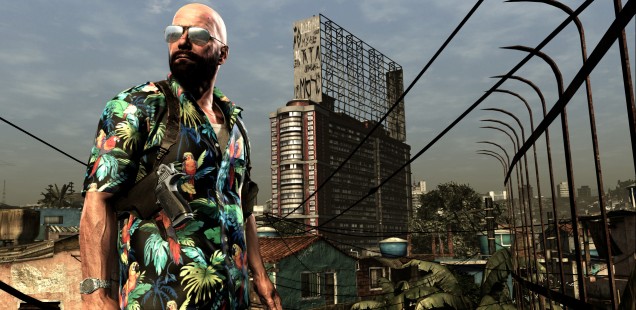
The Brazilian Job
Who is Max Payne? Jack Nicholls looking for the man behind the outrageous shirt.
“So I guess I’d become what they wanted me to be, a killer. Some rent-a-clown with a gun who puts holes in other bad guys. Well, that’s what they’d paid for, so in the end that’s what they got.” Max begins, now pointing his gun at the struggling body. “Here I was about to execute this poor bastard like some kind of dime store angel of death, and I realised they were correct. I wouldn’t know right from wrong if one of them was helping the poor and the other was banging my sister.”
And that’s where the intro ends, cutting back to Max’ drunken exploits as a bodyguard for São Paolo’s most affluent. But now, after some ten hours of tearing up the city in search of answers, you are back at the gruesome scene to conclude the previous cinematic. But it’s not a cutscene anymore. The man before you, we have come to learn, is Armando Becker, head of a corrupt police force involved in human trafficking, organ harvesting and the murder of Max’ clients. Do you shoot him?
It’s not a very significant choice on the grand scale of things. At this point Max has already shot dead enough people to keep grave diggers in pocket until retirement, and Becker is dying anyway. In a way you’re only extending his agony by denying him a bullet. He’s already dead. But whether you decide to end his life personally or leave him to burn for his sins speaks to Max’ motives, and your interpretation of his character.
Is Max Payne a mad murderer or a remorseful killer? Have the deaths of his wife and child broken him, left him to wage an endless war on the terrors of his past or does he just want to do some good before death reunites him with his family? Does he kill because he has to or because he is beyond caring? Is he a grim reaper or a lost man trying to make a difference the only way he knows how?
Your personal analysis of Max character culminates in the decision to shoot or not to shoot Becker, but Rockstar have been weaving these considerations in throughout the game. Many of Max Payne 3’s combat arenas are swarming with unarmed civilians. You are free to shoot them without reprimand, if you’re feeling reckless, or you can go out of your way to minimize civilian casualties.
At one point in the game, while fighting through the police station housing Becker’s operation, an armed goon bursts into the room only to see Max standing over the bodies of his slaughtered colleagues, and drops his gun in surrender. You are free to kill him -perhaps you’ve already shot him on instinct as he threw open the door, missing this scene entirely – but he’s no longer a threat to you. He won’t come after you.
The image of surrender is twice powerful, forcing you to think carefully about your next move, to trust him and spare him or to cover your back and punish him. But the fact that this one man out of all the goons you fought surrenders to you in this particular and deliberate setup also shows that he fears you, and possibly for something other than your superior skills. Does he take you for a madman? Or a crusader?
Perhaps Rockstar themselves consider one interpretation more in line with their intended reading than the other, since sparing Becker grants an achievement while shooting him does not. Still, ultimately it’s up to you to decide whether Max kills only when he has to, or is entirely unhinged. Is he a crazed gunman or unfortunate would-be hero?
So, do you shoot him or not?
Jack Nicholls studies Broadcast Journalism at Staffordshire University by day and keeps the local take-aways in business by dinner time.